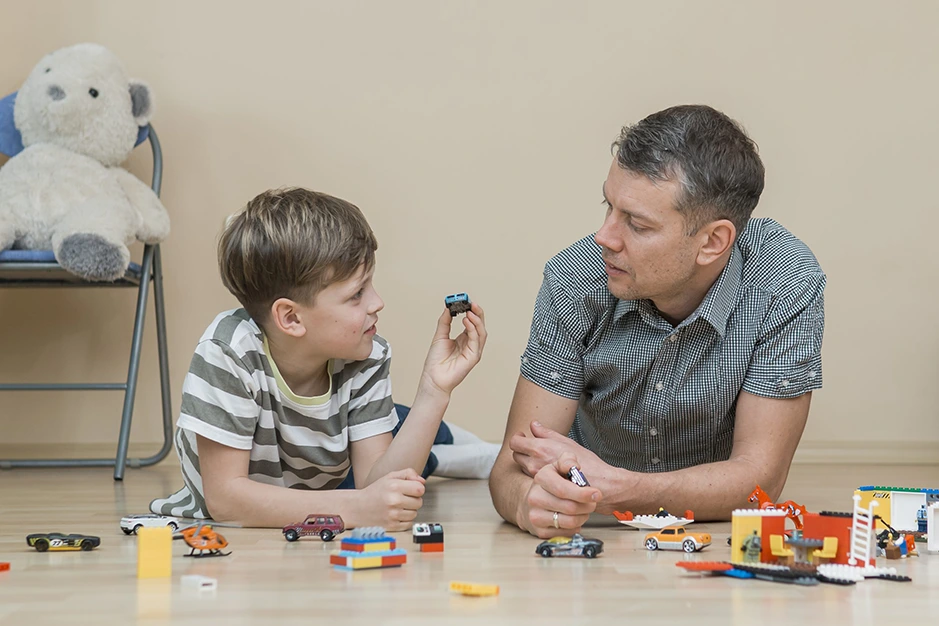Play Therapy for Brain, Speech & Emotional Development
Play Is Not Just Fun — It’s the Brain’s Natural Way to Grow, Learn, and Communicate
Play is the work of the child. It’s how the brain grows, how speech emerges, how emotions are expressed, and how social skills take root.
At our center, Play Therapy is a research-backed, neurodevelopmental intervention used to support children with autism, ADHD, speech and language delays, developmental delays, social-emotional challenges, and more.
From a neuroscientific perspective, play activates and connects multiple areas of the brain that are essential for:
- Cognitive development
- Speech and language acquisition
- Communication and social interaction
- Emotional bonding and regulation
- Praxis (motor planning) and executive functioning


Neuroscience Behind Play: How Play Builds the Brain
According to research from Harvard’s Center on the Developing Child and studies in developmental neuroscience:
- Play stimulates neuroplasticity, helping the brain form and strengthen new neural connections
- During play, the brain releases dopamine, oxytocin, and other neurochemicals that enhance learning, motivation, and social bonding
- Play involves sensorimotor, cognitive, and emotional integration — engaging the frontal cortex, limbic system, and language centers of the brain
Play is the only activity that simultaneously develops a child’s:
- Sensory processing
- Motor planning (praxis)
- Speech-language skills
- Social cognition
- Emotional self-regulation
Play and Speech-Language Development
Children learn to communicate through play — by taking turns, using gestures, making sounds, pretending, and naming objects.
Research shows that symbolic play and pretend play are directly linked to the development of expressive and receptive language.
In play therapy sessions, we use language modeling, joint attention, verbal routines, and engaging play-based interaction to help children:
- Develop spontaneous speech
- Learn new words and sentence structures
- Improve sound production and articulation
- Use language for social interaction and emotional expression
For children with autism, structured play therapy often leads to the first words, first conversations, and first emotional connections.
How Play Therapy Supports Neurodevelopmental Milestones
Motor Planning (Praxis)
Children with neurodevelopmental disorders often struggle with planning and sequencing movements. Play therapy provides the repetition, variation, and sensory input needed to develop:
- Bilateral coordination
- Motor sequencing
- Hand-eye coordination
- Fine and gross motor control
Cognitive Skills
Problem-solving, imagination, decision-making, and flexible thinking all emerge through play. Games, pretend scenarios, puzzles, and sensory-rich play stimulate:
- Executive functioning
- Working memory
- Cause-effect reasoning
- Attention span and task persistence
Social Interaction
Play creates a natural environment to learn:
- Turn-taking and sharing
- Joint attention and eye contact
- Reading facial expressions and body language
- Cooperative problem-solving and peer interaction
Emotional Regulation
Therapeutic play helps children:
- Express emotions safely (joy, fear, anger, sadness)
- Build resilience and coping strategies
- Develop self-awareness and empathy
Research & Evidence Supporting Play Therapy
Numerous studies confirm the power of play in child development:
- The American Academy of Pediatrics (AAP) emphasizes play as essential for cognitive, emotional, and language development.
- Lifter & Bloom (1998) found that symbolic play is a strong predictor of expressive language development.
- Play-based interventions such as DIR/Floortime, JASPER, and NDBI (Naturalistic Developmental Behavioral Interventions) have shown success in improving communication, engagement, and flexibility in children with autism.
- Neuroimaging studies confirm that during pretend play, the brain shows activity in regions responsible for language, social cognition, and emotional regulation.
Our Play Therapy Approach
Our therapy combines:
- Developmental Play
- Speech and Language Therapy through Play
- Cognitive and Emotional Coaching
- Sensory-Integrated Play
- Parent-Child Interaction Therapy
- Social Stories and Role Play
We use play as a tool to create adaptive responses, stimulate brain development, and help children build essential life skills.
If your child is showing speech delay, social withdrawal, emotional dysregulation, or developmental concerns, Play Therapy could be the most natural and effective path to progress.

